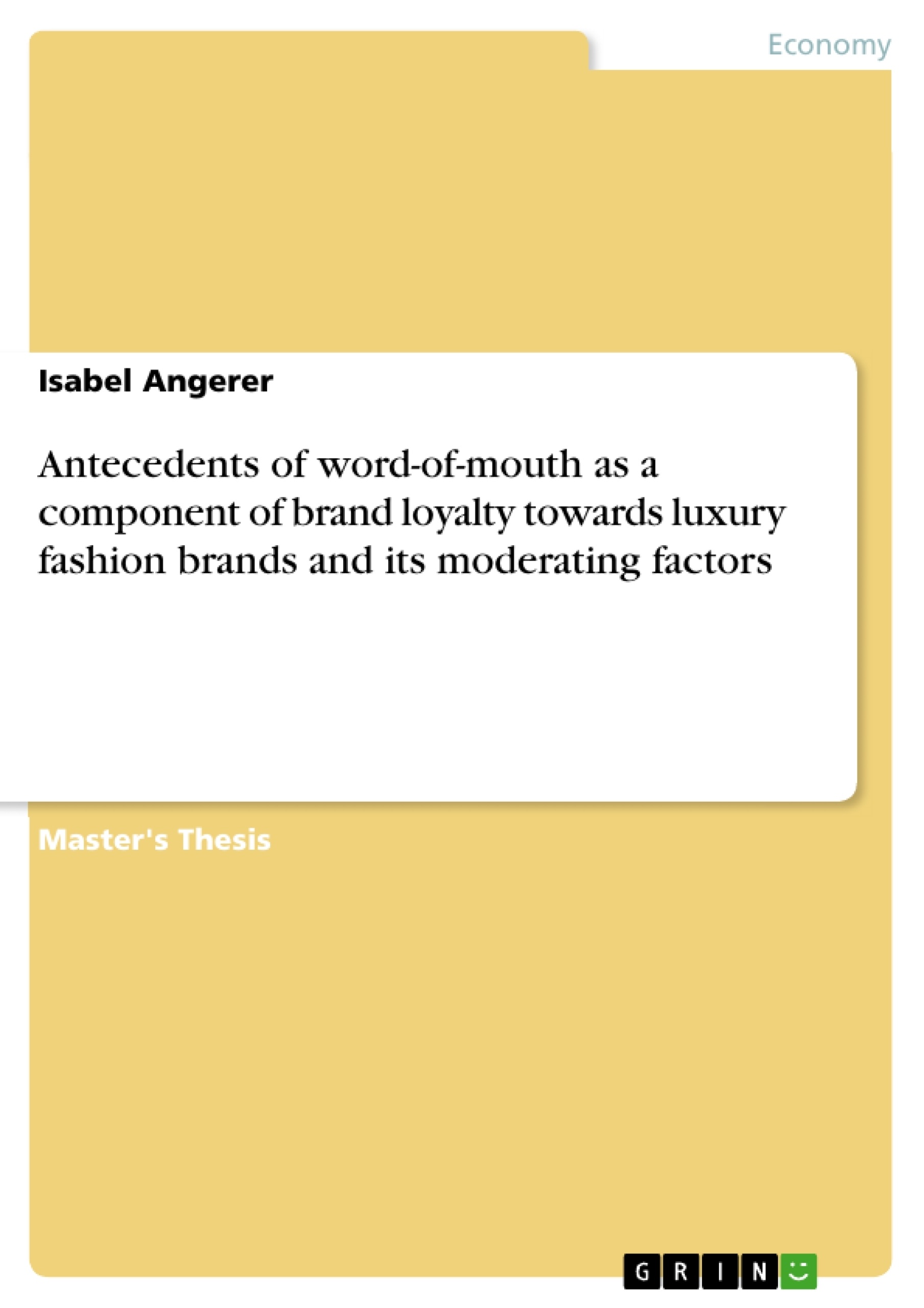In today’s competitive marketplace, companies need to establish a loyal customer base in order to be successful. In particular, the fashion industry relies on a loyal customer base and a good reputation to achieve sustainable financial growth. To survive the current challenges of growing competition, marketers must ensure that customers do not only develop a personal relationship with brands but also speak favourably of them. Prior research has focused on word-of-mouth as a component of brand loyalty and its antecedents. However, this topic turned out to be inadequately investigated in the specific context of luxury fashion brands.
Hence, the aim of this study is to examine how satisfaction, trust and commitment but also socio-psychological factors influence the consumer and thus have an impact on word-of-mouth. The nature of this study led to a quantitative methodological approach: an online survey investigating the sources of word-of-mouth. As a conclusion, this paper confirmed that trust and commitment were among the most important predictor variables of word-of-mouth. The main finding was, however, that socio-psychological factors such as materialism, social identity and possessiveness also increased positive word-of-mouth. However, since materialism and possessiveness are regarded as negative personality traits and cannot strengthen the effect of satisfaction, trust and commitment on word-of-mouth it is recommended that marketers concentrate on positive dimensions of word-of-mouth and brand loyalty (i.e., trust and commitment) in order to build a strong customer relationship.
Table of Contents
- ABSTRACT
- ACKNOWLEDGEMENT
- CHAPTER 1: INTRODUCTION
- 1.1. RESEARCH AIM AND OBJECTIVES
- 1.2. STRUCTURE OF RESEARCH
- CHAPTER 2: LITERATURE REVIEW
- 2.1. INTRODUCTION
- 2.2. FASHION
- 2.2.1. LUXURY
- 2.3. BRAND LOYALTY AND WORD-OF-MOUTH
- 2.4. ANTECEDENTS OF WORD-OF-MOUTH
- 2.4.1. SATISFACTION
- 2.4.2. TRUST
- 2.4.3. COMMITMENT
- 2.5. EXPECTED PREDICTOR VARIABLES AND MODERATING FACTORS
- 2.5.1 SOCIAL IDENTITY
- 2.5.2. MATERIALISM
- 2.5.3. POSSESSIVENESS
- CHAPTER 3: CONCEPTUAL FRAMEWORK
- 3.1. CONCEPTUAL MODEL
- 3.1.1. AIMS AND OBJECTIVES
- CHAPTER 4: RESEARCH METHODOLOGY
- 4.1. INTRODUCTION
- 4.2. DEDUCTIVE RESEARCH APPROACH
- 4.3. QUANTITATIVE RESEARCH METHOD
- 4.4. QUESTIONNAIRE METHOD
- 4.5. QUESTIONNAIRE CONTENT
- 4.6. MEASUREMENT CONSTRUCT
- 4.7. DATA COLLECTION AND SAMPLING
- 4.8. ETHICAL CONSIDERATION
- CHAPTER 5: DATA ANALYSIS AND RESULTS
- 5.1. INTRODUCTION
- 5.2. DESCRIPTIVE ANALYSIS
- 5.2.1. DEMOGRAPHICS
- 5.2.2. LUXURY BRAND CATEGORIES AND SOCIAL IDENTITY GROUPS
- 5.3. KEY ANALYSIS
- 5.3.1. RELIABILITY ANALYSIS
- 5.3.2. ONE SAMPLE T-TESTS
- 5.3.3. HYPOTHESES TESTING USING MULTIPLE REGRESSION ANALYSIS
- CHAPTER 6: DISCUSSION
- 6.1. INTRODUCTION
- 6.2. LUXURY BRAND CATEGORY AND SOCIAL IDENTITY GROUP
- 6.3. SIGNIFICANT AND INSIGNIFICANT PREDICTOR VARIABLES
- 6.3.1. SATISFACTION, TRUST AND COMMITMENT
- 6.4. SIGNIFICANT EXPECTED PREDICTOR VARIABLES
- 6.4.1. POSSESSIVENESS, MATERIALISM, AND SOCIAL IDENTITY
- 6.5. INSIGNIFICANT MODERATION
- CHAPTER 7: CONCLUSION, MANAGERIAL RE-COMMENDATIONS, LIMITATIONS AND FUTURE RESEARCH
- 7.1. INTRODUCTION
- 7.2. CONCLUSION
- 7.3. MANAGERIAL RECOMMENDATION
- 7.4. LIMITATIONS AND FUTURE RESEARCH
Objectives and Key Themes
This dissertation investigates the factors that influence word-of-mouth communication regarding luxury fashion brands and its role in brand loyalty. It explores how satisfaction, trust, and commitment, as well as socio-psychological factors such as social identity, materialism, and possessiveness, impact consumer behavior and contribute to positive word-of-mouth.
- The impact of satisfaction, trust, and commitment on word-of-mouth communication
- The influence of socio-psychological factors such as social identity, materialism, and possessiveness on word-of-mouth
- The role of word-of-mouth as a component of brand loyalty in the luxury fashion industry
- The implications of these findings for marketers seeking to build strong customer relationships and foster positive word-of-mouth communication
- The identification of key predictor variables and moderating factors influencing word-of-mouth communication towards luxury fashion brands
Chapter Summaries
Chapter 1 provides an introduction to the dissertation, outlining the research aim and objectives, and presenting the structure of the study. Chapter 2 delves into the existing literature on fashion, luxury brands, brand loyalty, word-of-mouth communication, and its antecedents, specifically focusing on satisfaction, trust, commitment, social identity, materialism, and possessiveness. It also discusses the expected predictor variables and moderating factors that influence word-of-mouth communication. Chapter 3 presents a conceptual framework, outlining the conceptual model and its aims and objectives.
Chapter 4 focuses on the research methodology used in the study. It explains the deductive research approach, the quantitative research method employed, the questionnaire method utilized for data collection, and the ethical considerations involved. Chapter 5 details the data analysis and results obtained from the study. It includes descriptive analysis of demographics and luxury brand categories, as well as key analysis of reliability, one-sample t-tests, and hypotheses testing using multiple regression analysis.
Keywords
The core concepts of this dissertation revolve around brand loyalty, word-of-mouth communication, luxury fashion brands, satisfaction, trust, commitment, social identity, materialism, possessiveness, quantitative research, and multiple regression analysis. These keywords encapsulate the main themes and research focus of the study, providing insights into the factors influencing consumer behavior and brand loyalty in the context of luxury fashion.
What drives word-of-mouth for luxury fashion brands?
Key drivers include customer trust, commitment, and satisfaction, as well as socio-psychological factors like social identity and materialism.
How does social identity influence brand loyalty?
Consumers often develop a personal relationship with luxury brands that reflect their social identity, leading them to speak favorably about the brand to others.
What role do materialism and possessiveness play in word-of-mouth?
While materialism and possessiveness can increase positive word-of-mouth, they are regarded as negative traits that do not necessarily strengthen long-term brand relationships.
Why is word-of-mouth critical in the fashion industry?
The fashion industry relies heavily on reputation and loyal customer bases to achieve sustainable financial growth amidst growing competition.
What should luxury marketers focus on to build loyalty?
Marketers should concentrate on positive dimensions such as building deep trust and commitment to foster authentic and sustainable word-of-mouth.



